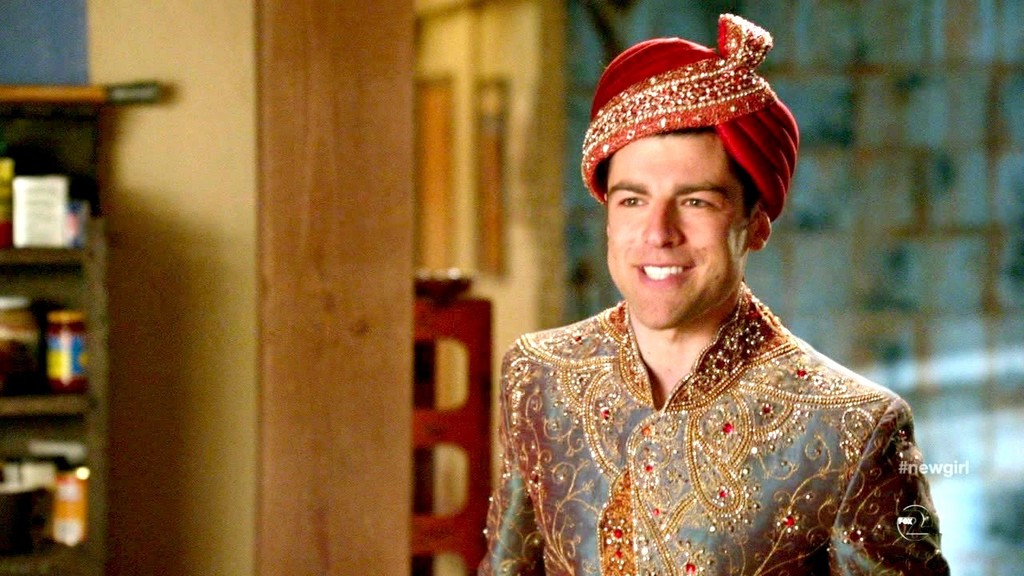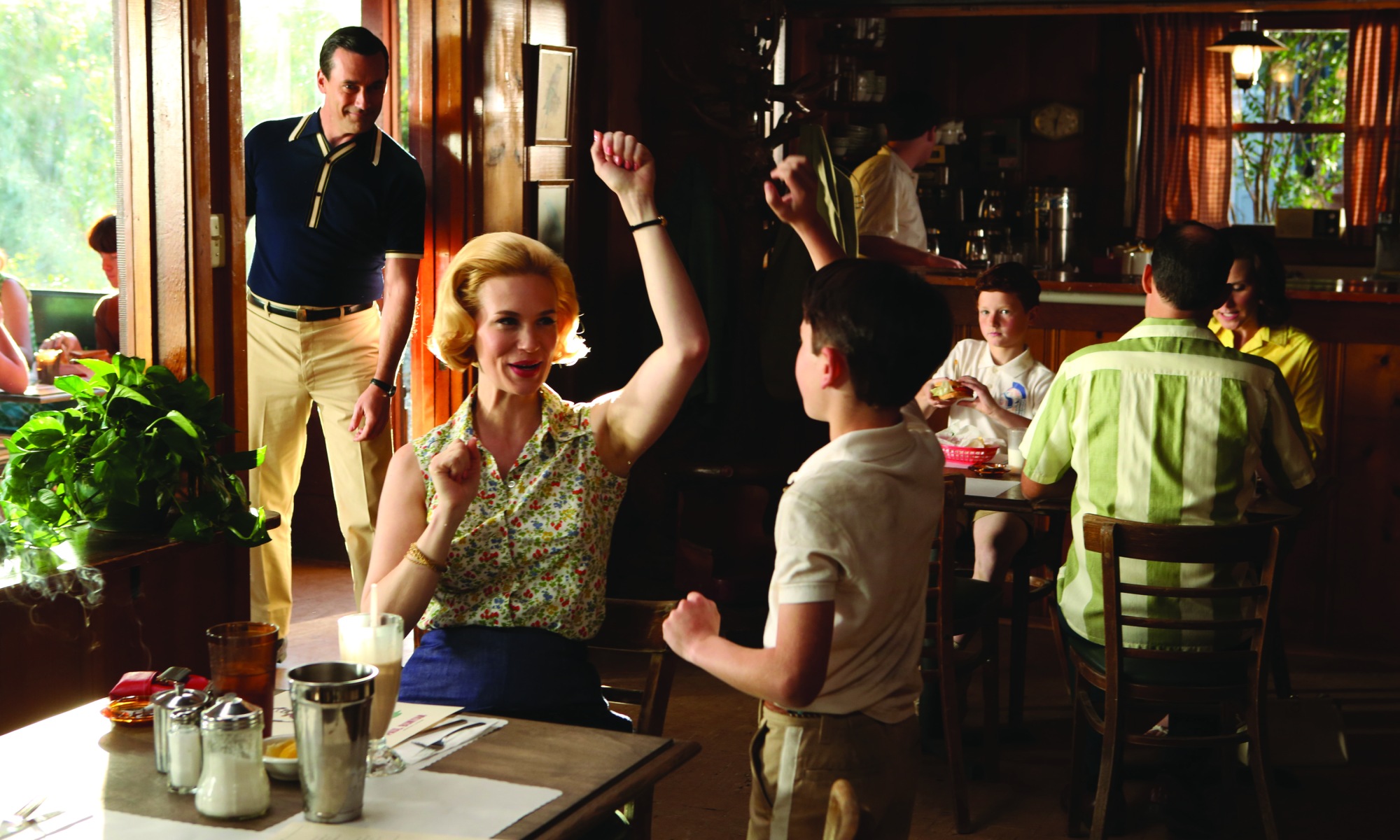Ray Richmond is an AwardsLine contributor. This story appeared in the June 12 issue of AwardsLine.
The question of how publicists generate sufficient buzz and attention to land their lesser-known TV series performer clients Emmy nominations is one that has no single answer. It’s something of a combination of the right advertising, effective marketing, timely late-night talk show appearances, savvy social media campaigning—and luck. And then, of course, the actor or actress requires the necessary goods in terms of talent or no amount of effort will matter.
Jillian Roscoe, vp of talent at ID-PR in Los Angeles, includes among her client list a handful of series regulars who landed their first Emmy noms (and, in a few cases, wins) under her guidance. They include Max Greenfield (a surprise comedy supporting actor nominee last year for Fox’s New Girl), Ty Burrell (nominated the past three years and a comedy supporting winner in 2011 for ABC’s Modern Family), Jim Parsons (a lead comedy nominee since 2009 and winner in 2010 and ’11 for CBS’ Big Bang Theory) and four-time nominee John Slattery of AMC’s Mad Men.
“There isn’t any secret,” Roscoe maintains, ”except to have very talented clients. My job is simply to make sure that the right people—i.e. TV Academy voters—have my people on their radar. I don’t need to spin anything. It’s about strategically targeting, and I’m just a bridge.”
One longtime personal publicist with several high-profile TV clients who prefers to remain anonymous emphasizes that the cooperation and participation of a client in any campaign often makes the difference between earning a nomination and being overlooked. “You hope they’re together with you on it,” she explains. “And if they’re not pushing, you have to try everything: Late-night shows, daytime show appearances, special-issues interviews. The ultimate question is, do you do a mailing or buy ads yourself?”
Richard Licata, executive vp of communications at NBC and who has helped spearhead Emmy campaigns at HBO, Fox, Showtime and other networks, makes the point that sometimes getting attention for younger talent requires patience, and that often you need to first plant a seed and look for it to sprout a year or two later. ”That’s how it worked when we tried to get a supporting nom for Merritt Wever on Nurse Jackie back in 2010,” Licata recalls. “And then finally, Merritt was nominated in 2012.”
Standout Drama Guest Roles
Paula Bernstein is an AwardsLine contributor. This story appeared in the June 19 issue of AwardsLine.
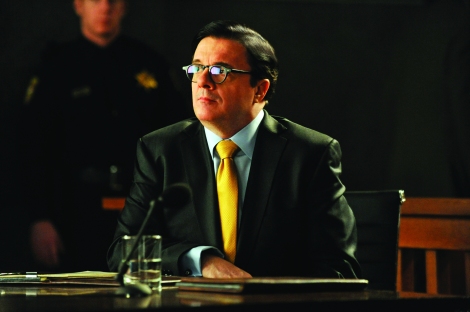 Nathan Lane
Nathan Lane
WHAT: The Good Wife
WHY: “Why would I joke?” asks Nathan Lane’s Clarke Hayden, the trustee brought in to oversee Lockhart/Gardner and get the firm back on track. It’s a fitting question for Lane, who is better known for his comic delivery than for his dramatic chops. But, as the levelheaded Hayden, Lane forgoes the over-the-top theatrics and delivers a quiet performance that could earn him his first Emmy nom in a drama category (he’s been nominated previously for comedy guest roles on Frasier, Mad About You and Modern Family).
ONE-LINER: “I don’t like people who quit.”
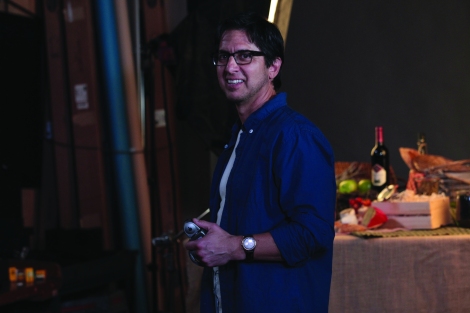 Ray Romano
Ray Romano
WHAT: Parenthood
WHY: As Hank Rizzoli, the blunt, socially awkward wedding photographer who woos Sarah Braverman, Ray Romano creates a character that is both misanthropic and romantic—not an easy feat. His complex, restrained performance makes us root for Hank in spite of, or perhaps because of, his neuroses. Although Romano was nominated six times in the lead actor category for Everybody Loves Raymond and won once (in 2002), he has never been nominated in a drama category.
ONE-LINER: “You’re pretty. You’re nice, and I like talking to you.”
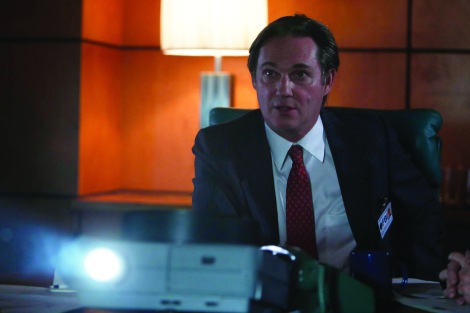 Richard Thomas
Richard Thomas
WHAT: The Americans
WHY: Up until now, Richard Thomas has been best known for his lead role as John-Boy on The Waltons (for which he won in 1973), but that could change with the actor’s role as sturdy Agent Frank Gaad on The Americans, a performance that escalates in intensity as the season progresses. On a show where nobody is who he or she seems to be, Gaad is a straight shooter who, thanks to Thomas’ performance, we can believe.
ONE-LINER: “They kill us, we kill them. It’s the world we live in. But even in this world, there are lines that can’t be crossed.”
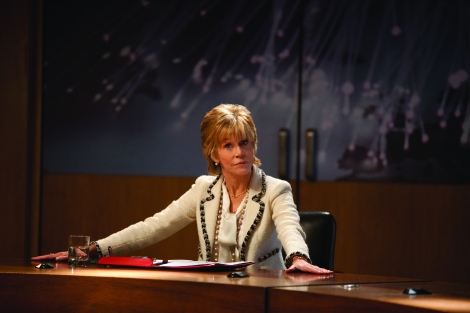 Jane Fonda
Jane Fonda
WHAT: The Newsroom
WHY: Fonda has described her character on The Newsroom as “Rupert Murdoch marinated in a little Ted Turner.” Playing the steely CEO of Atlantis Media, Leona Lansing, the former Mrs. Ted Turner (who previously won an Emmy for The Dollmaker in 1984) gives a performance that is understated and scene-stealing.
ONE-LINER: “What happened to human interest stories? Obesity, breast cancer, hurricanes, older women having babies, iPhones?”
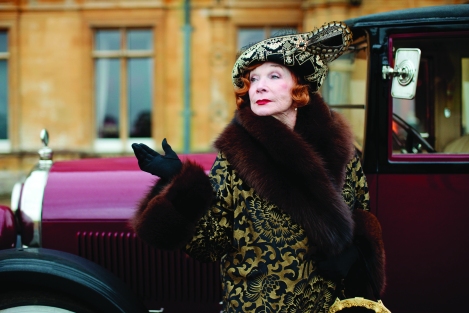 Shirley MacLaine
Shirley MacLaine
WHAT: Downton Abbey
WHY: When Shirley MacLaine’s Martha Levinson sweeps into Downton Abbey’s third season as Cora’s forward-thinking American mother, she provides the ideal foil for Dame Maggie Smith’s Dowager Countess. Her showstopping performance could earn the veteran actress her first guest drama Emmy (she was nominated for a lead actress Emmy in 2009, for her portrayal of the title character in Lifetime’s TV movie Coco Chanel).
ONE-LINER: “It seems so strange to think of the English embracing change.”
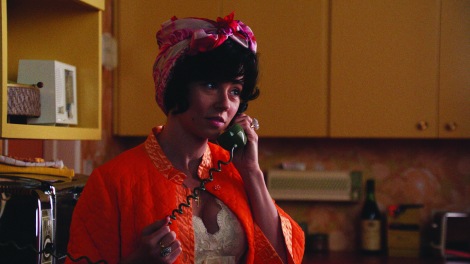 Linda Cardellini
Linda Cardellini
WHAT: Mad Men
WHY: When Cardellini appeared on Mad Men as Don Draper’s latest conquest, Twitter was abuzz. Could that really be fresh-faced Lindsay Weir from Freaks and Geeks? After we got over the initial surprise of seeing Lindsay/Linda all grown up, we marveled at her detailed portrayal of Sylvia Rosen, Don’s mystery neighbor-lover and Megan’s confidante. Cardellini’s coy performance added depth and intrigue to the role of the “other woman.”
ONE-LINER: “What do you want for this year?”
DPs Get Creative to Give Series a Filmlike Look
Thomas J. McLean is an AwardsLine contributor. This story appeared in the June 19 issue of AwardsLine.
Cinematography that stands out from the TV crowd is now about more than looking better than most other shows—it’s about getting a look that meets the high standards once reserved only for feature films.
But with television schedules and budgets typically only a fraction of their big-screen counterparts, cinematographers on shows such as Mad Men, Breaking Bad, The Good Wife and Vikings use every lighting and camera tool or trick at their disposal to deliver the goods.
Digital technology and the popularity of cameras like the Alexa, which operates well in low-light conditions, have helped immensely, but it still takes creativity to find camera moves and lighting techniques that truly stand out.
Going back to basics has paid off for AMC’s Mad Men. Cinematographer Christopher Manley likes, whenever possible, to drop the second camera typically used to ensure closeups and coverage of every scene. “We set up A shots, and if the B shot can work without compromising either shot, then we’ll use it. Otherwise, we don’t,” he explains.
The result is more medium shots, giving the closeups more impact and evoking a classic big-screen style. “Doing closeups a lot of the time in television is more about a holdover style from when TVs were much smaller and people were sitting in their living room looking at a 20-inch screen 8 feet away,” says Manley. “Nowadays, everybody has a large 16:9 television that dominates their living room, so I think it’s OK to go back to a more old-fashioned scale of using wider shots.”
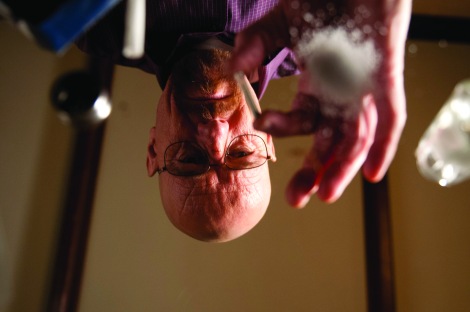
Sister AMC show Breaking Bad goes for the opposite effect, giving itself over to experimentation in shooting. That freedom allows cinematographer Michael Slovis, who joined the show in its second season, to stage all kinds of shots from a one-shot 5-minute teaser and vantage points as diverse as toilet bowls and wine glasses, to shots using macro and periscope lenses.
“The mandate was to tell the story any way that you could, organically, and that expanded our brush strokes,” he says. “We expanded our skill set to a more traditional film approach rather than television.”
The intelligent way the show was set up allowed Slovis to eschew traditional coverage and keep the show on its 12-hour-a-day, eight-day-per-episode shooting schedule.
Another advantage that Breaking Bad had, especially in its early years, was shooting on film—a practical decision that had immense creative payoff. “The autonomy of the camera when we started was really important,” Slovis says. “At the time, you still had to tether digital cameras to a recorder, and it would have slowed us down tremendously.”
Veteran TV cinematographer John Bartley says having most of the scripts for History’s Vikings in hand early on was key to prepping the series shoot in Ireland. Using digital Alexa cameras and soft Panavision Primo lenses, Bartley used cranes, remote cameras and lifts. “We kept it moving all the time,” he says.
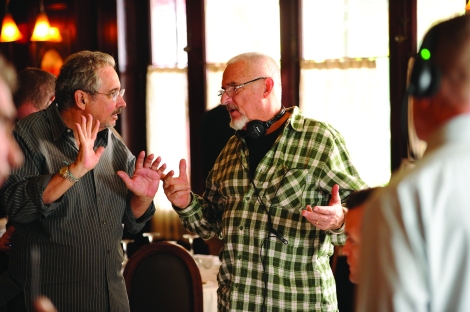
Quick lighting solutions are another way to get a cinema-quality look on TV. On CBS’ The Good Wife, cinematographer Fred Murphy uses large-scale lighting and self-lit sets to limit or eliminate the need to relight every shot. “You could move in and shoot the closeup, and the camera could move through the set and there wouldn’t be any relighting,” he says.
On Mad Men, Manley says the lighting has evolved from a studio style to a more naturalistic look, aided by a switch from film to the Alexa in Season 5. “The Alexa allows you to work with less light, and it’s very exciting,” says Manley.
Bartley tapped into the special-effects department to create and manage fires and candles for Vikings as practical light sources, supplemented by fluorescent lights. “I kept saying we could never have enough candles, and they got very good at being able to make them brighter and darker,” says Bartley.
Of course, working on a series has the benefit of standing sets that very quickly become a known quantity for cinematographers and their crews.
“It’s always faster onstage, particularly when you’re working on sets you know inside and out and have worked on many times before,” says Manley. “The danger is that you start repeating yourself, and it can get stale, so I’m always looking for ways to try to keep it fresh.”
Drama Race Handicap
Nellie Andreeva is Deadline’s TV editor. Michael Ausiello is founder and editor in chief of TVLine. This story appeared in the June 19 issue of AwardsLine.
The shows that have won the best drama Emmy for the past five years, AMC’s Mad Men and Showtime’s Homeland, both have been going through up-and-down seasons recently. That is not expected to affect each show’s nomination chances, but it does open the door to an upset. Will AMC’s Breaking Bad finally land a series nom? Or will PBS’ Downton Abbey accomplish the rare feat of winning two top Emmy categories after earning the movie/miniseries trophy two years ago? HBO’s red-hot Game of Thrones also appears likely to get another nom. And then there is Netflix’s newcomer, House of Cards. Here’s a look at each show’s chances for gold come September.
THE AMERICANS
Because FX’s 1980s-set spy yarn is still in its freshman season—and still suffering from comparisons to Showtime’s Homeland—its best bets for nominations are probably in the lead acting categories for Keri Russell and Matthew Rhys, and supporting for Noah Emmerich, though their chances might be hampered by their lack of Emmy history.
BATES MOTEL
A&E’s moody Psycho prequel stands its best Emmy chance with Oscar-nominated star Vera Farmiga.
BOARDWALK EMPIRE
Because this category is more crowded than a Game of Thrones cast party—and HBO’s Prohibition-era drama has never generated much heat—it might not be able to eke out a third consecutive nomination. On the other hand, Bobby Cannavale—so good as the year’s big bad, Gyp Rosetti—might have a chance for a supporting actor nom. (He won in 2005 for Will & Grace and earned a second nom for Nurse Jackie in 2012.)
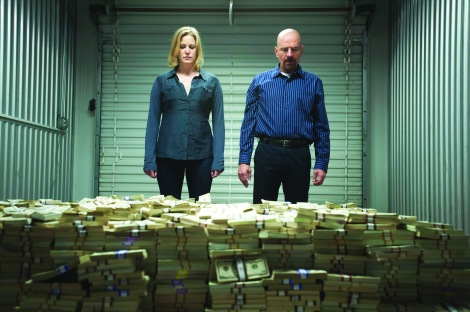
BREAKING BAD
Nominations for AMC’s meth-fueled hit and its stars—three-time lead actor winner Bryan Cranston and two-time supporting actor winner Aaron Paul—should be no-brainers. The fact that the series’ last season was an abbreviated eight episodes long—and those episodes aired a summer ago—might, if only slightly, diminish its chances. However, the launch of the final eight-episode installment will coincide with the kickoff of the second phase of Emmy voting, likely keeping the show on voters’ minds.
DAMAGES
Passed over for the Emmy twice already, DirecTV’s now-dead-and-buried legal thriller has virtually no shot at being nominated this year. The same can’t be said of star Glenn Close, who’s already taken home the lead actress prize in 2008 and 2009.
DEXTER
Showtime’s serial-killer thriller finally played its trump card last season—by revealing the title character’s deadly pastime to sorta-sister Deb. But its time might have passed: 2012 marked the first year that it wasn’t nominated since 2007. So it will probably have to settle for a nom for five-time nominee Michael C. Hall or, if it’s really lucky, a first for Jennifer Carpenter.
DOWNTON ABBEY
PBS’ acclaimed period piece rebounded from a shaky second season with a more warmly reviewed third. And it kept people talking by killing off two major characters (RIP, Matthew and Sybil). If nothing else, count on a supporting actress nomination for Dame Maggie Smith, who already won twice (once when the show was nominated as a miniseries, and again when it entered drama).
ELEMENTARY
CBS’ modern-day take on Sherlock Holmes is about as likely to be nominated as its lead detective is to miss a clue. Its only chances are noms for Jonny Lee Miller or Lucy Liu (a contender for Ally McBeal all the way back in 1999).
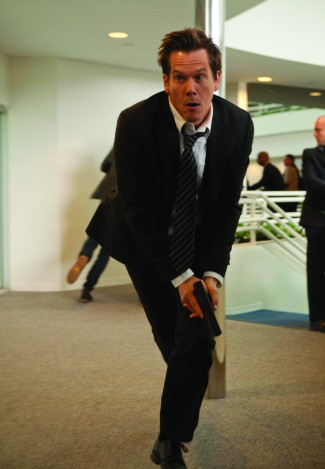
THE FOLLOWING
If there’s one thing the Emmys love, it’s movie stars doing television. So although Fox’s Kevin Williamson chiller probably won’t scare up a nom, matinee idol Kevin Bacon could.
GAME OF THRONES
No longer a niche hit, HBO’s mainstream breakout is a lock for a third consecutive nomination. Unfortunately, the cast is so large that it’s nearly impossible for voters to single out any performer, with the exception of two-time nominee and 2011 supporting actor victor Peter Dinklage
THE GOOD WIFE
Though passed over for a nomination in 2012, CBS’ law-office drama-procedural hybrid could break back into the race this year—first, because it had a solid season, and second, because it’s one of the very few broadcast dramas to have any shot. Julianna Margulies (2011’s lead actress victor) is also a safe bet to receive a nom.
HANNIBAL
NBC’s well-reviewed Silence of the Lambs prequel probably needn’t set an extra place at dinner for Emmy. But, if for no other reason than making us forget Sir Anthony Hopkins’ version of Dr. Lecter for a moment, Mads Mikkelsen deserves to be a contender.
HOMELAND
In spite of complaints that, in its second season, the Showtime smash became a soap opera, it remains a lock for a second nomination. Mandy Patinkin might also sneak into the supporting actor race on the heels of last year’s lead wins for Damian Lewis and Claire Danes.
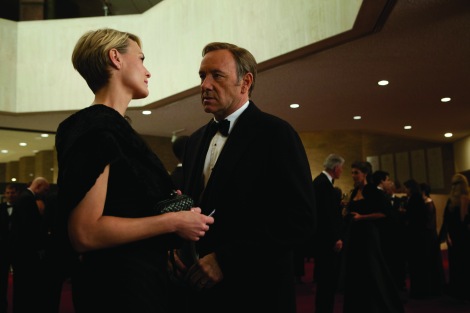
HOUSE OF CARDS
Speaking of how Emmy loves movie stars doing television, it definitely applies to two-time Academy Award winner Kevin Spacey and his political drama. The only question is, will voters recognize the actor—a 2008 Emmy nominee for HBO’s Recount—or the series? If the answer turns out to be both, leading lady Robin Wright—herself no stranger to the multiplex—could also get lucky.
JUSTIFIED
Thanks to Margo Martindale’s star turn two years ago as mommie dearest Mags Bennett, FX’s modern-day western was able to break into the Emmy derby. Now, buoyed by a well-reviewed fourth season, the show seems well-positioned to do so again.
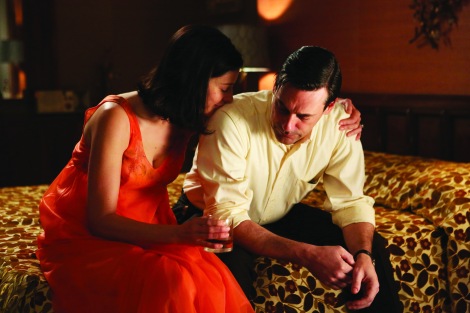
MAD MEN
The good news for AMC’s signature hour: Nicotine-stained though it may be, it still is the network’s prestige crown jewel. Therefore, a sixth consecutive nomination is a foregone conclusion. The bad news: So far, this season has had viewers and critics alike crying “been there, done that.” Worse, it’s yet to provide a showcase for any actor that might break
the cast’s stunning losing streak. (To date, not even Jon Hamm has won an Emmy.) Its record: 0 for 25.
NASHVILLE
Just about any project that Connie Britton takes on becomes a contender (Friday Night Lights, American Horror Story). But even if three-time Emmy nominee Britton’s track record isn’t enough to get voters to recognize ABC’s backstage soap opera, it’s undoubtedly enough to bag her a fourth nod. And Britton’s colead, Hayden Panettiere, also had many more chances to shine this season, which elevates her chances.
THE NEWSROOM
Though this HBO property is a freshman series, its creator is the ultimate Emmy catnip: Six-time winner Aaron Sorkin. Add to that mix the two Golden Globe nods the show received in December, and both it and leading man Jeff Daniels are looking pretty good to be nominated.
PARENTHOOD
NBC’s sleeper is coming off its strongest season yet, but it’s still a longshot for a nomination. (To date, only guest actor Jason Ritter has been recognized.) Its great white hope: Monica Potter, who shone in the storyline that found her character, Kristina Braverman, battling cancer.
SCANDAL
Watercooler buzz doesn’t get much louder than the fandemonium that surrounds this Shonda Rhimes sudser. If voters are willing to look past some of the D.C. drama’s over-the-top plot twisting, not only the ABC hit but leading lady Kerry Washington—and supporting players Jeff Perry and Bellamy Young—could be on the receiving end of nominations.
SOUTHLAND
Though TNT’s gritty (and now canceled) LAPD drama has long had critics behind it, the only Emmy love it’s ever been shown was for stunt coordination. Its last chance to change that for Michael Cudlitz, who gave the performance of his life as Officer John Cooper.
SHAMELESS
William H. Macy’s boozy Frank Gallagher has about as much of a chance of getting his hands on a top-shelf drink as his Showtime sleeper does of being nominated. However, the actor—as well as costar Emmy Rossum—might have a chance.
SONS OF ANARCHY
As much as Emmy loves movie stars doing television, that’s how much it hates bikers. That’s the only way to explain how—even coming off its highest-rated season to date—FX’s fringe hit still won’t get a nomination. (Odds are, it won’t—even badass Katey Sagal has been snubbed!)
SUITS
After a promising first season that earned star Patrick J. Adams a SAG nomination, USA’s legal drama Suits upped its game in Season 2. While it is a longshot, it could break into the acting categories with stars Adams and Gabriel Macht, scene-stealing supporting actor Rick Hoffman and recurring guest star Rachael Harris.
THE WALKING DEAD
Now that AMC’s zombie smash is cable’s top drama, voters might not be able to look down their noses at it. So even if the genre series itself doesn’t break in, perhaps Andrew Lincoln will earn a nom.
Andy Patrick contributed to this report.
Standalone Episodes Give Showrunners Creative Freedom
Ari Karpel is an AwardsLine contributor. This story appeared in the June 19 issue of AwardsLine.
The first four episodes of Season 2 were pretty much business as usual on HBO’s Girls. Hannah (series creator Lena Dunham) kicked her roommate out after she discovered he slept with her best friend; then she procured coke and had sex with her neighbor as research for an article she had been assigned to write.
That’s when something unexpected happened. In the fifth episode of the love-it-or-hate-it series’ second season, Hannah went down the proverbial rabbit hole.
After a brief scene at the Brooklyn café where Hannah works, the rest of the episode tracked her with a brand-new character, handsome doctor Joshua (Patrick Wilson), playing out a relationship of sorts in his beautifully appointed brownstone. There was topless Ping-Pong, sex in the kitchen and, by the end of the half hour—which took place over two days—an emotional awakening unlike any Hannah had previously experienced. “I don’t think I realized before I met you that I was lonely,” she confesses to Joshua, who turns out to have no interest in her inner life. We never see Joshua again.
“That’s the first hard thing for her that’s leading to the OCD,” showrunner Jennifer Konner explains, referring to the dramatic obsessive-compulsive disorder symptoms that Hannah would manifest later in the season. “We looked at this episode as the rampup.”
And yet even Konner admits that “One Man’s Trash,” as the episode is titled, wasn’t part of the original plan for the season. “Lena wrote it two nights before the table read, like in a fever dream,” says the executive producer. “She came to us with it and said, ‘I don’t know what this is, but I wrote this.’ It was such an insane little movie, we had to make it.”
Girls is not the first serialized TV show to take breaks from its ongoing storyline for filmlike vignettes that upend the usual episode structure, but it employs the technique more often than most. Two episodes later, viewers found themselves far from Hannah’s Brooklyn stomping ground, at the upstate New York home of Jessa’s (Jemima Kirke) parents. “It’s a cliché to say about HBO, but they give you an unbelievable freedom to do what you want to do,” says Konner, who acknowledges HBO’s recently canceled Enlightened as another series that uses so-called standalone episodes to great effect.
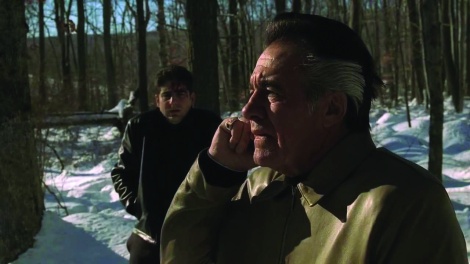
The practice arguably goes back to Star Trek, and it was used quite a bit in such 1990’s sci-fi/fantasy series as Deep Space Nine and The X-Files, and continued with Lost and Dr. Who. But TV writers single out one series, also on HBO, for inspiring the spread of standalone episodes across the contemporary TV landscape: The Sopranos. “David Chase took it to such a masterful level,” says Konner. “In the writers’ room, it’s become shorthand. (Executive producer Judd Apatow) will say, ‘The Russian in the woods!’, and we’ll know what he means.”
She’s talking about the “Pine Barrens” episode of Sopranos’ third season, in which Christopher (Michael Imperioli) and Paulie (Tony Sirico) get lost in the woods chasing a Russian mobster they’re trying to kill. (It has also been acknowledged as inspiration for the carjacking-kidnapping episode of Six Feet Under, titled “That’s My Dog.”)
But a funny thing happened when Sopranos creator David Chase rewatched the 2001 episode before speaking with AwardsLine about it: He discovered that it isn’t actually a standalone storyline. “There was a B story and a C story,” reports Chase. “People think of it as standalone because that part of the story is so memorable, and the writing (by Terence Winter, with a story credit by Timothy Van Patten) and acting are so good. What I take from that is they forgot the other stuff. I created the show, and I had forgotten the story about Jackie Jr.”
Nonetheless, when Chase conceived The Sopranos, he wanted it to feel like a series of short films. Looking back, he believes he achieved that best in “College.” The fifth episode of the series’ run has Tony Soprano (James Gandolfini) taking his daughter, Meadow (Jamie-Lynn Sigler), to visit schools in New England, where he spots a former mobster who has been in witness protection. Back home, Carmela (Edie Falco) receives a surprise visit from her priest. “You have all the information you need going in. It doesn’t refer to the episode before it, or after. It stands on its own.”
Chase thinks it’s wise of showrunners to submit such episodes for Emmy consideration. Like series pilots, which dominate the writing and directing categories, these episodes play well with voters who might not have seen the whole season. (Indeed, “College” earned Chase and James Manos, Jr. an Emmy for outstanding writing.)
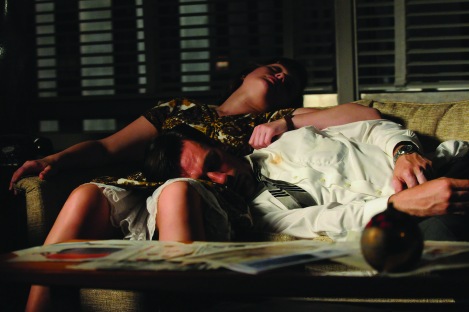
The Sopranos creator has been particularly impressed by standalone episode work done on shows created by two Sopranos veterans: Matthew Weiner (“The Suitcase” is arguably the best episode of Mad Men, standalone or not); and Terence Winter (Boardwalk Empire delved into incest in “Under God’s Power She Flourishes”). “It’s like a vacation,” Chase explains. “You go away for a week, even for work, and you come back feeling like you’ve learned something.”
In Season 2, “Higher Power” was done from the point of view of Levi (Luke Wilson) at rehab in Hawaii, and “No Doubt” from the POV of White’s own character, Tyler. Those episodes even had those characters’ voiceovers. “I think it helps clarify that character,” says White. “You really get into their inner psychology, and that’s something harder to do in dialogue. With the voiceover you could get into the internal mind of a character, especially mine, who was more of an introvert.”
Had the series continued, White could imagine using a standalone as a jumping off point for a whole new series, in much the way that episodes of Happy Days spawned Laverne & Shirley, Mork & Mindy and Joanie Loves Chachi. “It’s like we created a whole new pilot in Hawaii,” says White. “There was a whole new cast, new sets, different locations. It was fun.”
The standalone episode phenomenon is not exclusive to shows on HBO. NBC’s Community is more like a traditional comedy, meaning its storylines mostly stand on their own. But as often as possible, its fourth-season showrunners, Moses Port and David Guarascio, have followed the tradition established by creator Dan Harmon of doing ambitious episodes that break the show’s rules. In the current season, that meant doing one episode acted out by puppets.
There is one rule that must be followed by all showrunners doing standalone episodes, says Moses, “There has to be a reason why you’re telling your story.” In the case of the puppet episode (“Intro to Felt Surrogacy”), he explains that the school’s dean was using puppet therapy to resolve tensions among the group. “As silly as that might sound, it gives you a reason for going far afield.”
Sometimes the reason is not made explicit to viewers. The Girls episode with Jessa’s parents was inspired by a very real-life need. “We decided to do it because we had to get rid of her,” Konner says bluntly. “Jemima was pregnant, so that episode was going to be her leaving.”
In typical Girls fashion, Jessa’s departure was fairly obscure, signaled by a note on the counter. Hannah headed back to the city on her own. Jessa hasn’t been seen in an episode of Girls since.

